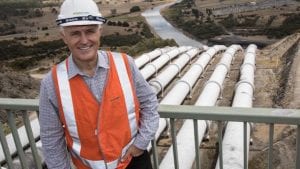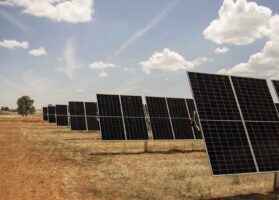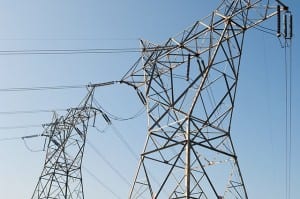Origin Energy has seen its profits virtually eliminated in the first half of the financial year, as renewable energy – and particularly solar – continue to eat into its one remaining coal plant, and as it prepares to replace that asset with a new big battery.
Origin on Thursday announced its net earnings for the December half had collapsed to just $13 million, down 98 per cent from the year prior, caused by a fall in electricity demand and rising costs of purchasing fuels, particularly gas.
Significantly, Origin Energy raised the prospect that “unsustainable” wholesale electricity prices could see the unplanned exit of coal-fired generators, including the company’s own Eraring power station, warning that the electricity market could be about to become “messy.”
“Throughout the first half, Origin continued to navigate the very challenging operating conditions facing the sector, as the pandemic caused a reduction in energy demand and depressed prices across key commodities,” Origin CEO Frank Calabria told shareholders on Thursday.
“As flagged in our recent earnings update, the near-term outlook for Energy Markets is more challenging. A mild summer has compounded already weaker demand and reduced volatility, gas supply costs are expected to increase, and wholesale electricity prices remain depressed, particularly as renewable supply continues to come online.”
Origin had prepared shareholders for a fall in earnings ahead of the release of its half-year results, warning earlier in the month that a spike in Asian gas prices had driven expenses higher and that revenues from its electricity generators had fallen by almost $300 million.
A milder summer had suppressed energy demand across Australia compared to the same period a year prior, and lower electricity use throughout Covid-19 lockdowns had pushed wholesale electricity prices lower.
With wholesale electricity prices falling below $50 per MWh for the first time for more than five years, Origin Energy’s CEO noted that this had fallen below the cost of new-build firm generation.
Calabria said that he was now anticipating a ‘supply response’ to the low prices – which would likely involve the retirement of some power stations being brought forward – and that this could include either planned or unplanned closures.
“Those wholesale prices now are below the cost of new-build firm generation. I would go as far to say that wholesale prices are unsustainable, there will be a supply response. And it’s just whether it’s planned or unplanned. And that’s really where the market is at today,” Calabria said.
“I think it’s actually going to be a pretty messy period of time, and I think you will see us running our generation less at Eraring. That’s what you’re seeing now. We have to do enough to keep capacity available when it’s needed and manage within the flexible sort of window of that that asset, but [lower generation] is going to be a feature,” Calabria added.
The comments are consistent with those of Energy Security Board chair Kerry Schott, who warned the energy market should be prepared for the early closure of a number of coal fired generators, as well as the analysis of RenewEconomy contributor David Leitch, as supply from renewables and subdued demand push ageing generators out of the market.
Calabria told Thursday’s investor call that the company had already commenced the process of phasing out its coal generator, with the 2,880MW Eraring power station already scheduled to close completely by 2032.
Calabria said that the company had started to pivot its focus away from operating the power station over the long term and would look to gradually wind down capital expenditure on the ageing plant, ensuring it remained available to supply power at during key periods, but acknowledging that it was becoming uneconomical to run as a general baseload generator.
“Even today, we have one Eraring unit not running, we are at minimum generation, and that is going to continue to be accelerated in terms of how we operate, because increasingly, it’s all about having the capacity when you need it, not the average energy for those assets. That’s where we’re focusing our attention,” Calabria said.
Origin has already flagged its intention to build a 700MW big battery at the site of the Eraring power station. The storage project would provide up to 2,400MWh of storage capacity and would allow the company to utilise the existing network infrastructure originally built for the Eraring power station.
It could see Origin effectively replace the Eraring coal plant with a big battery project over the next decade. It said it is progressing with expressions of interest from suppliers and contractors.
While the company’s energy generation business battled through a tough period, the energy’s retail energy business delivered more promising results. Origin’s customer base added 4,000 new customers throughout the second half of 2020, while the company successfully cut the costs to serve its customer base by $13 million.
Origin added that it had been encouraged by its success at cutting costs in its electricity retail business. The company has shifted more than 50,000 customers onto the ‘Kraken’ customer management platform, in which Origin secured a $500 million ownership stake last year.
Origin said that it had also implemented a new strategy for the management of its Renewable Energy Target obligations, opting to delay the surrender of Large-scale Generation Certificates (LGCs) and opting to pay a shortfall charge – with the expectation that the cost of LGCs will fall considerably over the next few years.
This is largely driven by the delay in its biggest contracted asset – the 530MW Stockyard Hill wind farm in Victoria, which is still not producing, more than a year after schedule and despite construction being completed several months ago.
See: Australia’s biggest wind farm faces yet more delays, Origin to pay penalty
Origin has three years to ‘make good’ its Renewable Energy Target obligations, and the company expects to save up to $112 million by delaying compliance.
Origin Energy shares were trading around 2 per cent lower during early trading on Thursday.
See also: Neither AGL nor Origin have convinced investors they have a future







